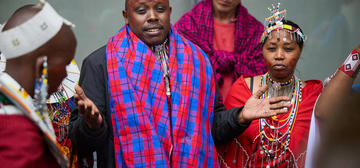A delegation from Kenya and Tanzania, comprised of members of the Maasai community, visited the Pitt Rivers Museum in September 2024 to reconnect with the objects and work with the museum team to identify possible next steps.
The Maasai Living Cultures Project started in 2017 when human rights activist Samwel Nangiria visited the Pitt Rivers Museum as part of an Indigenous Leadership programme organised by Insightshare. Over the next three years, Maasai representatives from both Kenya and Tanzania made three further visits to give guidance on the 188 Maasai objects in the collections at Pitt Rivers Museum and the collections at Cambridge and the Horniman. During these visits, the delegates expressed their concerns about the presence of 5 objects in the Pitt Rivers collections. They indicated that without spiritual intervention their continued presence in Oxford would cause great concern.

The delegation was comprised of members from the five families from whom the culturally sensitive objects were taken. From a Maasai perspective, these hereditary objects would never be given away or sold and therefore, they must have been taken by killing the owner and removing it from the body on the battlefield. The objects are considered as warriors and in Maasai tradition, when a warrior dies, they are not brought back home but are buried on the battlefield.
A welcoming ceremony was led by cultural advisors, during which delegates participated in the ceremonial blessing, reconnecting with objects that had been absent for over a century. Seeing the items provoked intense emotional and physical reactions, as their absence symbolised intergenerational suffering. Herbal medicines, Oseki and Eluaai, were ceremonially applied to the objects and consumed to aid emotional healing.
After a week of deliberations, the Maasai family delegates decided the objects should remain at the Pitt Rivers Museum. The delegates decided that it would be appropriate, given that the objects are being well cared for, that they would best be kept in the care of the Museum. This was deemed comparable to a soldier, having been killed overseas, being buried in a Commonwealth cemetery.
Having reached this decision, more cultural provenance information was shared and each family member gave further cultural guidance on how they would like the Museum to care for their objects. It was also agreed that the Maasai nation, families and individuals will have lifetime access to the five ornaments, which can be facilitated online.
Maasai representatives will work with the Museum on future collaborations to decide how the outcomes of this unique process and Maasai cultural traditions can be best represented in the permanent galleries of the Museum so that as many visitors as possible will learn from this process.
Click here to learn more about the Maasai Living Cultures Project on the Pitt River's website.